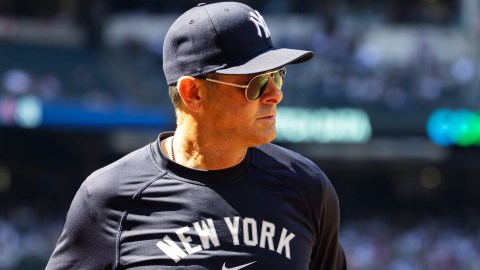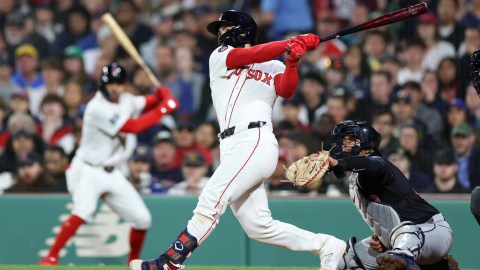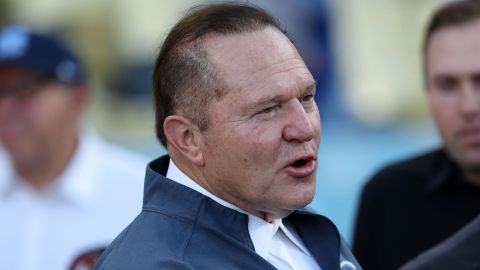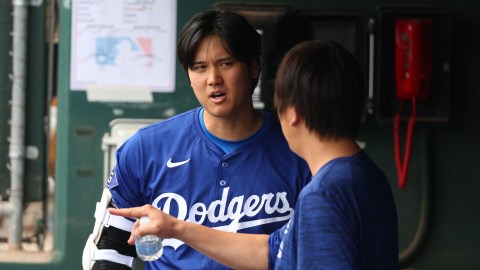 Another postseason, another Alex Rodriguez fade.
Another postseason, another Alex Rodriguez fade.
Rodriguez's struggles when playoff baseball begins have become so commonplace that the New York Post headlines fail to amuse. How many great puns can you make about a player stinking the same way every year, again and again?
As the Yankees moved on from a 3-2 defeat Monday night to host the final three games of the American League Division Series at Yankee Stadium starting Wednesday, the main topic of conversation was whether manager Joe Girardi would pull a Joe Torre and do the necessary — bump Rodriguez down in the batting order. Rodriguez has been batting third and, while his demotion in years past led to much discord, he's been so bad lately that he and Girardi most likely know a move has to happen.
Rodriguez has gone just 1-for-9 in the ALDS. He's drawn one walk and struck out five times.
This isn't a typical A-Rod playoff disappearance, though. Rodriguez never really got going this season, and his stats seem to say that he's in a three-year slump, unable to stay healthy and watching his numbers across all categories slip.
With Girardi spending Tuesday and Wednesday contemplating whether Rodriguez should be batting lower in the order, the Yankees should be spending the new few weeks contemplating whether Rodriguez should be batting at all. It's time to cut A-Rod loose.
The massive contract that Rodriguez signed in lieu of his already-huge deal from Texas keeps the slugger in New York until he's 42, and the Yankees have to pay it all — $29 million this year, $28 million next year, $25 million in 2014, $21 million in 2015 and $20 million apiece in the final two years. But whether the Yankees have to pay that amount to a star who has hung it up or to a struggling player who continues to drag his team down is still up for debate.
Eating the rest of Rodriguez's salary would be a major blow, even to a team like the Yankees. But as Rodriguez's production continues to plummet not only in the playoffs but also throughout the regular season, dragging down the team's results and taking time from other players, New York should start thinking about it.
The Yankees can't spend every October from now until 2017 worrying about the lineup as they try to balance Rodriguez's pedigree with his poor numbers. And they can't go into every spring training hoping the A-Rod of 2003 (a now-admitted steroid-use year) will show up.
Rodriguez is breaking down, his numbers are wilting, and he needs to be given a lesser role on the team — if any role at all — if the Yankees are going to take advantage of the good players they have and make progress in the always-tough American League.
Monday night's game was a fine example. Rodriguez was batting third, now his home since Robinson Cano has taken over the cleanup spot. He had a lackluster night, failing to score Ichiro Suzuki when the Yankees had pulled within 3-2 in the seventh inning. Rodriguez then stepped to the plate as the final batter of the game and did what many Yankees fans were fully expecting — he struck out.
Rodriguez still has the promise of power, but it rarely shows up. Rodriguez missed 36 games this year with a broken left hand, then had just one extra-base hit in his 17 games and 68 at-bats to wrap up the season. Injuries have marred his last three years, as he's batted just .270, .276 and .272, with his career average falling to .300. His slugging has fallen below .500 and looks unlikely to rebound.
After 13 straight 100-plus RBI seasons and 13 straight 30-or-more home run seasons, Rodriguez had just 62 RBIs last year and 57 this year (both injury-shortened campaigns). He hit just 16 home runs last year and 18 this year (even Derek Jeter had 15 in 2012). Rodriguez still struck out 116 times this year as well, the worst strikeout-to-at-bat ratio he's had in his career. He often looks overmatched at the plate and fails to cause fear in opposing teams.
The Yankees, meanwhile, have so many players who can bat at the top of the order that they often have to platoon their hitters and bat someone like 43-home-run-hitter Curtis Granderson in the No. 7 or 8 hole. Suzuki, who has rejuvenated his career with sharp and timely hitting since being traded from Seattle midway through the season, has been terrific from the No. 2 spot against Baltimore, bouncing Nick Swisher's big bat further down the lineup. Mark Teixeira has been shaky since returning from a calf injury but is still ripping the ball with enough force that he could justifiably take his old role batting third.
But the biggest factor against Rodriguez continuing to be prominent in the Yankees' batting order is his poor playoff track record.
That A-Rod could never hit in the playoffs is a myth. He was 16-for-50 in 2004 (.320), when the Yankees advanced to the ALCS. He was 19-for-52 in 2009 (.365), when he won his first championship with the Yankees. When he's been bad is every other year — coincidentally or not in years when New York failed to make it very far. Last year, for example, he was clubbing a crisp .111 as New York fell to Detroit. Against Baltimore this year, he's batting .111 again. And all of these numbers do not include what some people call "clutch" — the ability to actually record hits and drive in batters when it matters. Statistically, anecdotally, whatever — Rodriguez will likely go down as the biggest scapegoat of all time for not producing the offense he's so famous for when it actually matters.
The Yankees paid for a high-producing Rodriguez and are now sending out a fading player who appears unlikely to ever regain his MVP form, much less contribute stable production throughout a season. His greatness appears to have only been fueled by steroid use, with the effects of those choices now claiming his playing time as his body continually breaks down with chronic joint problems.
Yankees fans expect bad seasons and long DL stints. They'll put money on Rodriguez striking out rather than hitting a needed home run. They'll shake their head at the faux batting average built on hits when the team doesn't need them, coupled with outs when the team needs to score.
The Yankees owe Rodriguez a lot of money throughout the next few years, but that's no reason to keep him batting third, keep him in the lineup or even keep him on the team. Other players are ready to go, and Rodriguez continuing to fulfill the pessimistic storylines will only damage the team more.
New York fans don't want to watch Rodriguez until he's 42, and they don't care if the Yankees don't get a return on their money. They want a chance at success, and a player who is a liability to either get his act together or let someone else do it in his place.
Perhaps the best way the Yankees could get their money's worth out of that $29 million is to move it out of the way so others can fulfill its promise.



